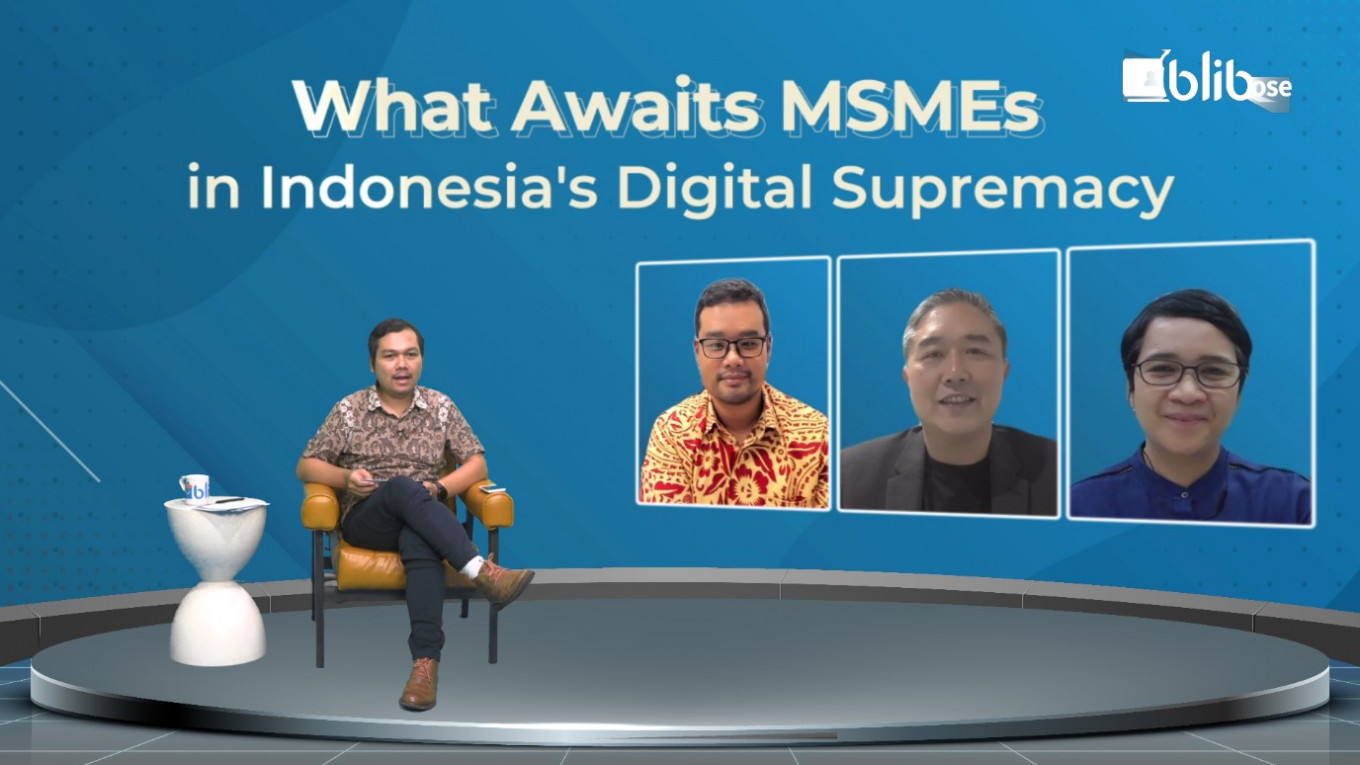Popular Reads
Top Results
Can't find what you're looking for?
View all search resultsPopular Reads
Top Results
Can't find what you're looking for?
View all search resultsDigitalization for recovery, growth in MSMEs: Study
Change text size
Gift Premium Articles
to Anyone
F
rom the lunch you bought through an online food delivery service to the batik shirt you wear on Fridays; micro, small and medium enterprises (MSMEs) are an integral part of Indonesia’s daily life and economy.
According to a recent study by e-commerce platform Blibli in collaboration with Boston Consulting Group (BCG) and Litbang Kompas, 99 percent of all business entities in Indonesia are MSMEs, contributing 60 percent of the national gross domestic product (GDP).
In his keynote address at the JakPost UpClose #43: What Awaits MSMEs in Indonesia’s Digital Supremacy webinar, Co- operatives and Small and Medium Enterprises Minister Teten Masduki noted that digitalization was essential for MSMEs, which employ 97 percent of Indonesia’s workforce, to rise and grow in their capacity as pillars of the national economy.
“To date, approximately 19.95 million MSMEs are connected to the digital ecosystem. The President has also mandated that 30 million MSMEs are on board the digital ecosystem in 2024. We believe that by increasing the number of MSMEs in the digital ecosystem, we can optimize the potential of the digital economy that is projected to be worth Rp 4.53 trillion [US$56.95 billion] in 2030,” he said.
Haikal Siregar, managing di- rector and partner at Boston Consulting Group’s Jakarta office, explained that the government’s sentiments are in line with the study’s findings.
The study identified three main issues faced by MSMEs, which include high operating costs, difficulty in driving revenue growth and barriers in terms of scaling and competitiveness. These is- sues were exacerbated by the CO - VID -19 pandemic, which caused reduced sales volume, shrinking capital resources as well as distribution bottlenecking.
“If there comes a time when they face other challenges, digitalization can help MSMEs as it enables them to reach a national or global audience, create operational efficiency, as well as streamline their transactions,” he said.
Mira Tayyiba, the Communications and Information Ministry secretary-general, as well as chair of the Group of 20 Digital Economy Working Group, said that global economic growth was projected to be at 2.9 percent in 2022, down from 5.7 percent in 2021.
Due to the downturn, data from the Finance Ministry showed that Indonesia was expected to lose Rp 1.36 trillion in missed opportunities to create added value.
“To achieve stable and continued growth, stronger macro- economic stability and a robust financial system is a must. It is believed that developing the MSME sector can and has contributed to Indonesia’s economic recovery and growth,” she said.
Mind-boggling challenges
Blibli CEO and cofounder Kusumo Martanto said the fact that MSMEs faced numerous challenges despite their major role in the economy was “mind-boggling”.
“When we started Blibli, we thought that as an Indonesian company made by Indonesians, there is something we can do to ad- dress the issue. We conducted the study last year, but Blibli itself has actively explored ideas on what we can do [for MSMEs],” he said.
Kusumo highlighted one finding from the study, which forecast Indonesia to become the largest contributor to the digital economy in Southeast Asia by 2025.
According to the study, MSMEs that had gone online were able to earn 1.1 times more revenue com- pared with those that only had an offline presence. Online MSMEs were also 2.1 times more likely to sell goods nationwide, and 4.6 times more likely to export to international markets.
At the same time, MSMEs with an online presence were 1.1 times more likely to involve their local community, while also 1.3 times more likely to hire others.
“If we look at it, MSMEs that have gone online are not only beneficial for themselves, but also for their surrounding communities,” Haikal said, adding that increasing MSME digital literacy from 20 to 50 percent can result in an estimated US$38 billion uplift by 2024.










